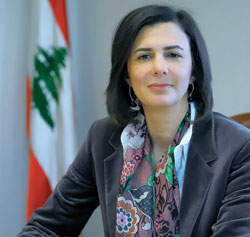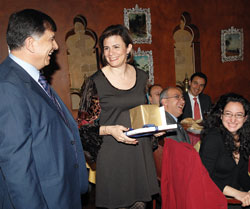First in Finance

Raya Haffar el Hassan, MBA '90, is Lebanon's first female finance minister.
Raya Haffar el Hassan, MBA '90, holds a pioneering post in a country struggling to maintain political stability. In November 2009, Ms. Hassan was named Lebanon's finance minister in its national unity cabinet. She is the first woman to serve in the position and one of only two female ministers.
Minister Hassan hopes a successful term will "pave the way for larger [female] participation in the public and private financial sector" in Lebanon, which underwent major political changes after several years of violent strife. Lebanese Prime Minister Saad Hariri, part of a pro-Western coalition, won a hotly-contested parliamentary election in June 2009. After nearly five months of debate about the composition of the new government, the national unity cabinet was born. Now Minister Hassan uses her globally-minded GW education to serve her country.
Minister Hassan has always strived for success. Twenty years ago, she left her home country to attend George Washington University, drawn by the academic reputation, the location, and the international feel of the university community. She credits GW with allowing her to "think out of the box, to interact with students from a variety of cultural backgrounds, to hone my presentation, analytical, and communication skills, and to think creatively in finding solutions to different challenges."
After graduating from GW, Minister Hassan returned to Lebanon and worked in the corporate planning and development with Méditerranée Investors Group. During the next two decades, she amassed an impressive array of experience in the corporate sector and government. Most recently, she worked in the Office of the Prime Minister on policy, technical, and capacity building projects, including playing a key role in economic reform and recovery after the 2006 war with Israel.

In March, Minister Hassan joined GW School of Business professor George Jabbour, MBA '83, PhD '89, (left) and two dozen other alumni and students for a private dinner in Beirut.
Though Lebanon and the world economy have been through a difficult stretch, Minister Hassan remains optimistic about the prospects for her country.
She points out that Lebanon has achieved an average growth of 8.5 percent in the past two years, and she believes that the country is "well placed to become a regional financial hub and to act as a service provider for the countries in the region.
"My challenge, therefore, will be to walk a tightrope between pursuing further fiscal consolidation to place the economy on a sustainable growth path while at the same time securing capital funding and investments that are necessary in the next few years to tackle the deficiencies in the Lebanese infrastructure," she says.
Minister Hassan has positive feelings about the prospects for current George Washington students, too. "With enough perseverance, effort and belief in one's self, and backed by a strong degree from one of the best academic institutions in the world, GW graduates are well placed to assume top positions in the private and public sectors," she says.
In March, Minister Hassan joined the leader of GW's Lebanon alumni chapter, Dr. Wissam el Solh, MBA '89; GW School of Business professor George Jabbour, MBA '83, PhD '89; and two dozen other alumni and students for a private dinner in Beirut.
"It is great to have people like [Minister Hassan] in these important positions," Dr. Jabbour says. "For me, it really brings home that we are teaching the future leaders in finance and business, not just in the United States, but around the world."
